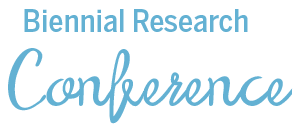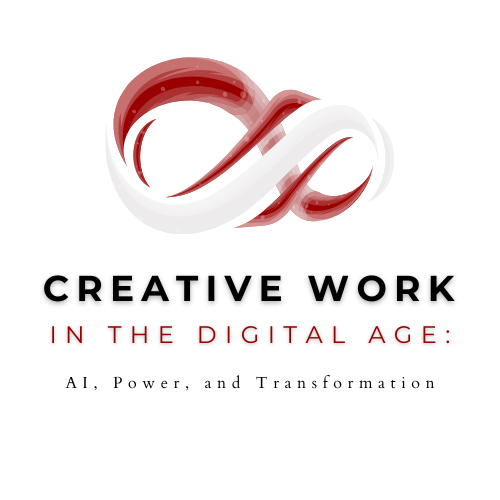AEI Lab Workshops & Symposia
The Arts, Entrepreneurship, and Innovation Lab hosts workshops and symposia gathering scholars and thinkers on key topics in arts and cultural affairs.
The Arts, Entrepreneurship, and Innovation Lab hosts workshops and symposia gathering scholars and thinkers on key topics in arts and cultural affairs.
The Arts, Entrepreneurship, and Innovation (AEI) Lab held an online 2-day symposium in June titled, Arts Engagement in AI World. The symposium featured keynote speakers, Brett Crawford and Linden Walcott-Burton, plus other speakers from the arts and technology.
Check out videos of each day of the Symposium.
The Arts, Entrepreneurship, and Innovation (AEI) Lab, in partnership with the Doris Duke Foundation, hosted a virtual symposium on July 27th. The symposium aimed to explore innovative ideas and new models for addressing inequities in the creative sector.
The event showcased the perspectives of leading thinkers and experts such as Michele Elam (Professor of Humanities & Faculty Associate Director at HAI Stanford University), Lauren Ruffin (Associate Professor of Worldbuilding and Visualizing Futures at Arizona State University and a co-founder of CRUX, Kamal Sinclair (Senior Director of Digital Innovation at The Music Center), and Sydney Skybetter (Deputy Dean & Senior Lecturer in Theatre Arts and Performance Studies at Brown University).
The event aimed to stimulate new ideas about challenges and opportunities for the creative sector. The main focus of the symposium was to encourage new paradigms centered around equity, technology, resilience, entrepreneurship, and innovation.
New. Not Normal. was a virtual symposium held in June 2020 about entrepreneurship, innovation, and reimagining the creative sector post-COVID-19. This event explored new ideas about both the challenges and opportunities for arts workers and the creative sector, how the creative landscape has already changed and will continue to change in the future. The event focused on learning from related fields, and the application of new ideas through creative sector work.
Leveraging Creativity was a virtual research workshop exploring new studies of arts, entrepreneurship, and the creative sector. The event consisted of two series of concurrent panels. The research from this workshop was featured in special issues in Small Business Economics Journal, Journal of Cultural Economics, and Artivate.

The Center for Cultural Affairs hosted the 22nd Association for Cultural Economics International (ACEI) conference in Bloomington, Indiana from 27-30 June 2023. The theme of the conference was Cultural Economics, Coming Together: Bridging Distances, Crossing Boundaries.
Please check out the ACEI 2023 conference website for more details.

The Biennial Research Conference gathers researchers from around the globe doing work in cultural affairs. The conference focuses on a different theme, or themes each session. Interested researchers submit abstracts for papers to be presented at the research conference. Select papers are reviewed and invited for presentation at Indiana University in Bloomington.
 Creative Work in the Digital Age: AI, Power, and Transformation
Creative Work in the Digital Age: AI, Power, and TransformationExploring How AI is Reshaping Creative Work, Power Structures, and Labor Dynamics
Date:
June 12, 2025, 1:00PM - 4:00PM
June 13, 2025, 9:00AM - 12:00PM
This conference examined how AI-driven tools are transforming the power structures and processes that define creative work, focusing on the transformative role of artificial intelligence (AI) in reshaping creative labor markets. The event was virtual, and key themes included AI’s influence on creative autonomy, skills transformation, and its implications for social equity in the creative industries.
This special issue invited scholars to analyze how AI and technology are transforming the power structures, processes, and equity of creative labor.
June 12, 2025 | |
1:00 PM | Opening Remarks |
1:15 PM - 1:45 PM | Michael Palmedo, U.S. Copyright Office: How Might AI Affect the Labor Market for Writers? |
1:45 - 2:15 PM | Hayoung Seo, Vanderbilt University: Fair Use or Copyright? Navigating Sociological Discourses between AI Corporations and Creative Workers |
2:15 - 2:20 PM | Break |
2:20 - 2:50 PM | Jun Zhou, University of Michigan -Goddess in the Machine: Gendered Humanness Work in the AI Automation Crisis |
2:50 - 3:20 PM | Emmanuelle Walkowiak, RMIT University: The Complementarity Versus Substitution Between Generative AI and Human Creativity |
3:20 - 3:50 PM | Ben Eltham, Monash University: The Lived Experience of Labour Displacement by AI Amongst Australian Illustrators and Photographers |
3:50 - 4:00 PM | Closing Remarks |
June 13, 2025 | |
9:00 AM | Opening Remarks |
9:15 - 9:45 AM | Magkou Matina, University Côte d’Azur - Creative Workers' Voices on AI Regulation Policies and Industry Developments: A Comparative US-EU Perspective |
9:45 - 10:15 AM | Valeria Pulignano, HBKU and KU Leuven - Reframing 'Art-for-Arts-Sake': Gen-AI and the Pursuit of Purposeful and Creative Meaning-Making in Professional Translation |
10:15 - 10:45 AM | Ellen Loots, Carolina Dalla Chiesa & Anne Heslinga, Erasmus University Rotterdam - Generative AI at Play: Surveying Interprofessional Boundary Work in Game Development |
10:45 - 10:50 AM | Break |
10:50 - 11:20 AM | Caitlin Petre & Julia Ticona, Rutgers University & University of Pennsylvania - From Motorized Projectors to Generative AI: Examining the Fraught Relationship Between Technology and Creative Work in Hollywood |
11:20 - 11:50 AM | Alexandrea J. Ravenelle, UNC Chapel Hill & Ken Cai Kowalski - AI is Taking Over the World...So I May as Well Just Go Along With It: Fractured Interest Identities Among Creative Workers |
11:50 - 12:00 PM | Closing Remarks |
For questions regarding our 2025 Biennial Research Conference, please contact ccaoneil@iu.edu.
For inquiries about the special issue or to discuss potential submissions, please contact the guest editors:
Democratizing Arts and Cultural Organizations
Date: June 27, 2023
Location: O'Neill School, 1315 E 10th Street, A335
This conference explored cases where and the extent to which arts and cultural organizations incorporate structures and practices intended to sustain or to create a workplace that is less hierarchical and unequal, and more participatory and consensus-based.
Scientific Committee:
Carole Rosenstein, George Mason University (Chair)
Antonio Cuyler, University of Michigan
Andrew Zitcer, Drexel University
All participation in the conference was in-person. There was no virtual or remote participation option.
The 2023 CCA Biennial Research Conference took place parallel to the opening day of the ACEI International Conference on Cultural Economics, also being held in Bloomington. See www.go.iu.edu/ACEI2023 for more information.
Both conferences were coordinated by the Center for Cultural Affairs, but otherwise they were completely autonomous from one another.
There was no registration fee for the CCA Biennial.
Final Program
| 9:00-9:30 | Registration & Coffee Registration is located in the O'Neill First Floor Commons, 10th Street Entrance. Coffee is located in the O'Neill Second Floor Atrium. |
| 9:30-10:00 | Carole Rosenstein, George Mason University; Antonio Cuyler, University of Michigan; Andrew Zitcer, Drexel University Welcome and Introductions |
| 10:00-10:30 | Brea Heidelberg, Drexel University Equity-focused Compensation & Radical Human Resources: Steps on the Path Toward Democratizing Arts and Cultural Organizations |
| 10:30-11:00 | Kathleen Hill, Dennie Palmer Wolf & Steven J. Holochwost, Wolf/Brown Building Equitable Pathways towards the Democratization of the Arts and Culture Sector: A Longitudinal Analysis of the Effects of the Bloomberg Arts Internship on Rising High School Seniors |
| 11:00-11:30 | Shanita Bigelow & Jennifer Novak-Leonard, University of Illinois Building and valuing navigational capital: alumni perspectives on fueling work and workplace change |
| 11:30-12:00 | Su Fern Hoe, Singapore Management University The Quest to Build Solidarity Amidst Precarity: Lessons from the Hyperactive Arts Sector in Singapore |
| 12:00-12:30 | Jen Benoit-Bryan, Slover Linett and SMU DataArts Museums Moving Forward |
| 12:30-1:30 | Lunch |
| 1:30-2:00 | Yuha Jung, University of Kentucky Differentiating 501(c)(3) Public Benefiting Art Museums from 501(c)(7) Social Clubs |
| 2:00-2:30 | Christina Park & Mako Fitts Ward, Arizona State University Analyzing the Landscape: BIPOC Arts and Culture Organizations in the Southwest |
| 2:30-3:00 | Raissa Simpson, Stanford University Mismatching, Troublemaking, Sanctuaries: Studying Placemaking Alterity in/and Culturally Affirming Spaces |
| 3:00-3:30 | Megan Young, Indiana University – Bloomington Artist-Driven Models at Warhol Regranting Sites |
| 3:30-4:00 | Amy Whitaker, New York University Designing Democracy |
| 4:00-4:30 | Carole Rosenstein, George Mason University; Antonio Cuyler, University of Michigan; Andrew Zitcer, Drexel University Closing reflections |
Cultural Policy Beyond the Here and Now: What do we owe to Future Generations?
June 7, 2021
This virtual event gathered researchers from around the globe doing work in cultural affairs. This year’s conference titled Cultural Policy Beyond the Here and Now: What do we owe to Future Generations? addressed cultural policy, specifically on the theme of policies that promote the preservation of culture and the arts for future generations. While the United Nations Educational, Scientific and Cultural Organization (UNESCO) has established protocols for the preservation of Intangible Cultural Heritage, how choices are made in terms of what most calls for preservation, the means by which this is achieved, and the decision-making processes, all warrant further study, in addition to how these principles are, explicitly or implicitly, adopted in national cultural policy.
Program and Policy Evaluation in Cultural Affairs
Decision-makers in the private and public sectors pursue desired outcomes for the creative industries, and the cultural sector in general, through various programs and policies. This puts great importance on empirical analyses of the success, or lack of success, in achieving those desired outcomes. Rigorous evaluation of programs and policies is essential in learning what interventions are more effective than others in achieving goals, the relative cost of programs relative to their outcomes, what are the unintended consequences of programs and policies, and ultimately in improving the efficacy of cultural policy.
This call for papers sought original applications of program and policy evaluation in the creative industries and arts policy.
Authors of selected proposals were invited to share their research at the May 2019 symposium that was held at the O'Neill School of Public and Environmental Affairs at Indiana University in Bloomington, Indiana. This research was published in a special edition of Cultural Trends.